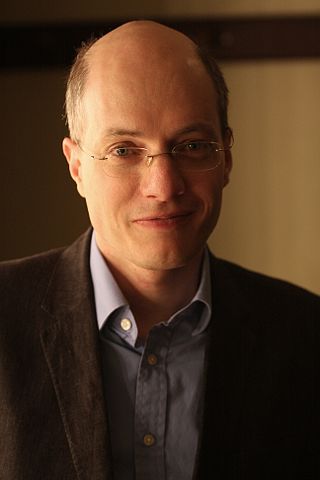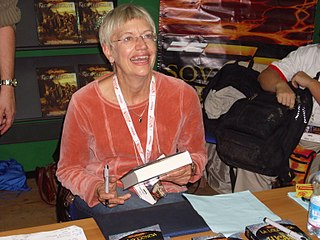Related Research Articles

Alfred Rupert Sheldrake is an English author and parapsychology researcher. He proposed the concept of morphic resonance, a conjecture that lacks mainstream acceptance and has been widely criticized as pseudoscience. He has worked as a biochemist at Cambridge University, a Harvard scholar, a researcher at the Royal Society, and a plant physiologist for ICRISAT in India.

Cory Efram Doctorow is a Canadian-British blogger, journalist, and science fiction author who served as co-editor of the blog Boing Boing. He is an activist in favour of liberalising copyright laws and a proponent of the Creative Commons organization, using some of its licences for his books. Some common themes of his work include digital rights management, file sharing, and post-scarcity economics.

Alain de Botton is a Swiss-born British author and public speaker. His books discuss various contemporary subjects and themes, emphasizing philosophy's relevance to everyday life. He published Essays in Love (1993), which went on to sell two million copies. Other bestsellers include How Proust Can Change Your Life (1997), Status Anxiety (2004), and The Architecture of Happiness (2006).

James Gleick is an American author and historian of science whose work has chronicled the cultural impact of modern technology. Recognized for his writing about complex subjects through the techniques of narrative nonfiction, he has been called "one of the great science writers of all time". He is part of the inspiration for Jurassic Park character Ian Malcolm.

Margaret Edith Weis is an American fantasy and science fiction author of dozens of novels and short stories. At TSR, Inc., she teamed with Tracy Hickman to create the Dragonlance role-playing game (RPG) world. She is founding CEO and owner of Sovereign Press, Inc and Margaret Weis Productions, licensing several popular television and movie franchises to make RPG series in addition to their own.
Joanna Dark is a fictional character and the main protagonist of the Perfect Dark video game series. She debuted in the Nintendo 64 first-person shooter Perfect Dark and is a player character in all the games of the series. Outside of video games, Joanna appears as the lead character in all the Perfect Dark novels and comic books. Joanna is an operative for the fictional Carrington Institute, where she was given the code name "Perfect Dark" in honor of her flawless performance in training tests.
Boing Boing is a website, first established as a zine in 1988, later becoming a group blog. Common topics and themes include technology, futurism, science fiction, gadgets, intellectual property, Disney, and left-wing politics. It twice won the Bloggies for Weblog of the Year, in 2004 and 2005. The editors are Mark Frauenfelder, David Pescovitz, Carla Sinclair, and Rob Beschizza, and the publisher is Jason Weisberger.

Edge is a multi-format video game magazine published by Future plc. It is a UK-based magazine and publishes 13 issues annually. The magazine was launched by Steve Jarratt. It has also released foreign editions in Australia, Brazil, France, Germany, Italy, and Spain.

Steven Berlin Johnson is an American popular science author and media theorist.
Trigger Happy is a book by Steven Poole, examining videogames in terms of their aesthetic appeal - what makes certain games more fun to play than others. It covers aspects such as the effective use of space and perspective in videogames, rewards and progression through games, the design of an appealing video game character and the debate over violence in games.
Naomi Alderman is an English novelist, game writer, and television executive producer. She is best known for her speculative science fiction novel The Power, which won the Women's Prize for Fiction in 2017 and has been adapted into a television series for Amazon Studios.

John Burnside FRSL FRSE was a Scottish writer. He was one of four poets to have won the T. S. Eliot Prize and the Forward Poetry Prize for one book. In Burnside's case it was for his 2011 collection, Black Cat Bone. In 2023, he won the David Cohen Prize.

Game Over: How Nintendo Zapped an American Industry, Captured Your Dollars, and Enslaved Your Children is a non-fiction book written by David Sheff and published by Random House, New York in 1993. It is dedicated to the history of the Nintendo electronic gaming company company. Based on many extensive interviews of high level historical figures, it has provided a research foundation for subsequent works, with a positive critical reception.
Kevin Barry is an Irish writer. He is the author of three collections of short stories and three novels. City of Bohane (2011) was the winner of the 2013 International Dublin Literary Award. Beatlebone (2015) won the 2015 Goldsmiths Prize and is one of seven books by Irish authors nominated for the 2017 International Dublin Literary Award, the world's most valuable annual literary fiction prize for books published in English. His 2019 novel Night Boat to Tangier was longlisted for the 2019 Booker Prize. Barry is also an editor of Winter Papers, an arts and culture annual.
Syeda Matanat Ghaffar, commonly known as Moni Mohsin, is a British-Pakistani writer based in London, United Kingdom. She wrote a long running satirical column 'The Diary of a Social Butterfly' for The Friday Times and a book with the same name.

Anna Anthropy is an American video game designer, role-playing game designer, and interactive fiction author whose works include Mighty Jill Off and Dys4ia. She is the game designer in residence at the DePaul University College of Computing and Digital Media.

Dr Tom Chatfield is a British author, broadcaster, and tech philosopher. Chatfield has written books on digital culture. He is also a public speaker on the subject area. Chatfield was appointed Chair of the Authors' Licensing and Collecting Society (ALCS) in 2023.

The Information: A History, a Theory, a Flood is a book by science history writer James Gleick, published in March 2011, which covers the genesis of the current Information Age. It was on The New York Times best-seller list for three weeks following its debut.

Religion for Atheists: A non-believer's guide to the uses of religion is a book by Alain de Botton published in 2012. It argues that while supernatural claims made by religion are false, some aspects of religion are still useful and can be applied in secular life and society. Religion for Atheists was published in the UK in hardback edition by Hamish Hamilton, and in the US by Pantheon. Religion for Atheists was a New York Times non-fiction bestseller, and has been widely reviewed, with mixed results.

The Utopia of Rules: On Technology, Stupidity, and the Secret Joys of Bureaucracy is a 2015 book by anthropologist David Graeber about how people "relate to" and are influenced by bureaucracies. Graeber previously wrote Debt: The First 5000 Years and The Democracy Project, and was an organizer behind Occupy Wall Street. Graeber signed a book deal with Melville House toward the end of 2014, and The Utopia of Rules was released on February 24, 2015.
References
- ↑ "Google Scholar Citations". Google Scholar. Retrieved 29 January 2023.
- ↑ "Steven Poole | Edge Magazine". Edge-online.com. Archived from the original on 2 March 2010. Retrieved 11 March 2011.
- ↑ "Literary festival unveils luminous line-up – Books – Entertainment". The Sydney Morning Herald. 30 March 2006. Retrieved 11 March 2011.
- ↑ Future And Reality Of Gaming, Vienna Games Conference Archived 17 August 2009 at the Wayback Machine
- ↑ Frauenfelder, Mark (15 January 2008). "Steven Poole's book on the aesthetics of video games now a free download". Boing Boing. Retrieved 11 March 2011.
- ↑ "French journalist wins T.R. Fyvel Book Award". 31 March 2006.
- ↑ "Extract: Introduction". Unspeak. Retrieved 11 March 2011.
- ↑ Alastair Campbell (10 February 2006). "Review: Unspeak by Steven Poole | Books | The Guardian". London: Books.guardian.co.uk. Retrieved 11 March 2011.
- ↑ "Unspeak". Unspeak. Retrieved 11 March 2011.
- ↑ Berkmann, Marcus (9 November 2013). "The best funny books for Christmas". The Spectator. Retrieved 11 May 2016.
- ↑ Poole, Steven (28 June 2016). "Why bad ideas refuse to die". The Guardian . Retrieved 30 June 2016.
It is important to rethink the notion that the best ideas reliably rise to the top: that itself is a zombie idea, which helps entrench powerful interests.
- ↑ Steven Poole (7 March 2007). "Transfini". Steven Poole. Retrieved 11 March 2011.
- ↑ Steven Poole (18 January 2005). "Review: Status Anxiety by Alain de Botton | Books". The Guardian. London. Retrieved 11 March 2011.
- ↑ Steven Poole (31 January 2008). "Trigger Happy, the movie". Steven Poole. Retrieved 11 March 2011.
- ↑ "Media". Unspeak. Retrieved 11 March 2011.
- ↑ Steven Poole at IMDb
- ↑ Music, StevenPoole.net
- ↑ EVOL Archived 20 March 2008 at the Wayback Machine , ChrisVincze.info
- ↑ EVOL (2006) at IMDb